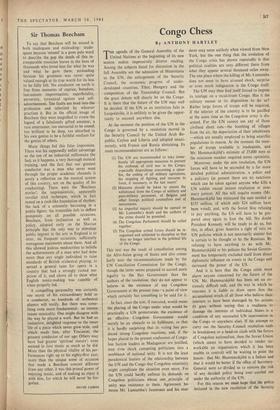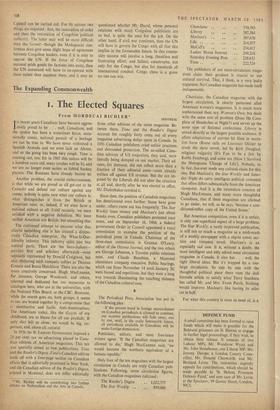Congo Chess
By ANTHONY HARTLEY
THE agenda of the General Assembly of the United Nations at the beginning of its new session makes impressively diverse reading. Among the subjects listed for discussion in the full Assembly are the admission of Mauretania to the UN, the enlargement of the Security Council, the economic progress of under- developed countries, Tibet, Hungary and the composition of the Trusteeship Council. But the great debate will clearly be on the Congo. It is there that the future of the UN may well be decided. If the UN as an institution fails in Leopoldville, it is unlikely to be given the oppor- tunity to succeed anywhere else.
At the moment the position of the UN in the Congo is governed by a resolution moved in the Security Council by the United Arab Re- public, Ceylon and Liberia and adopted unani- mously, with France and Russia abstaining. Its main recommendations are as follows:
(1) The UN are recommended to take imme- diately 'all appropriate measures to prevent the outbreak of civil war in the Congo, especially dispositions concerning a cease- fire, the ending of all military operations, the stopping of fighting and recourse to force, if necessary, in the last resort.'
(2) Measures should be taken to ensure the withdrawal from the Congo of military and para-military personnel, of Belgian and other foreign political counsellors and of mercenaries.
(3) An impartial inquiry should be opened on Mr. Lumumba's death and the authors of the crime should be punished.
(4) The Congolese Parliament should be called together.
(5) The Congolese armed forces should be re- organised and subjected to discipline so that they no longer interfere in the political life of the Congo.
This text was the result of consultation among the Afro-Asian group of States and also comes fairly near the recommendations made by the UN Conciliation Commission for the Congo, though the latter seems prepared to accord more legality to the Ileo Government than the authors of the resolution; they do not appear to believe in the existence of any Congolese Government at the present time—a point of view which certainly has something to be said for it.
In fact, since the text, if executed, would mean the placing of the- Congo under what would be practically a UN protectorate, the existence of an effective Congolese Government would merely be an obstacle to its fulfilment, so that it is hardly surprising that its voting has pro- duced strong Congolese reactions, and, if the hopes placed in the present conference of Congo- lese faction leaders in Madagascar are justified, may even shock competing politicians into a semblance of national unity. It is not the least paradoxical feature of the relationship between the UN and the Congo that Congolese unanimity might complicate the situation even more. For the UN could hardly enforce its demands on Congolese politicians whose one, principle of unity was resistance to them. Agreement be- tween Mr. Lumumba's lieutenant and his mur- derer may seem unlikely when viewed from New York, but the one thing that the evolution of the Congo crisis has shown repeatedly is that political realities are very different there from what they appear several thousand miles away. The one place where the killing of Mr. Lumumba does not seem to have aroused shock, surprise or even much indignation is the Congo itself.
The UN may then find itself forced to impose its tutelage on a recalcitrant Congo. Has it the military means at its disposition to do so? Rather large forces of troops will be required, if the interior of the country is to be pacified at the same time as the Congolese army is dis- armed. For the UN cannot use any of those civilised short cuts—the bombing of villages from the air, the deportation of their inhabitants —which are usually employed to bring anarchic populations to reason. At the moment the num- ber of troops available is inadequate, and Mr. Hammarskjold's estimate of 25,000 men as the minimum number required seems optimistic.
Moreover, under the new resolution, the UN forces will have to be seconded by a far more detailed political administration, a police and a judiciary (at present there are no sanctions which can be taken against anyone who kills a UN soldier except instant retaliation or sum- mary justice). All this will require money (Mr. Hammarskjold has estimated the sum needed at $135 million, of which only $24 million have been voted), and, with the Soviet bloc refusing to pay anything, the US will have to be pre- pared once again to foot the bill. No doubt President Kennedy will be ready to do so, but this, in effect, gives America a right of veto on UN policies which is not necessarily sinister but is certain to be thought so by the Russians. By refusing to have anything to do with Mr. HammarskjOld or his policies the Soviet Govern- ment has temporarily excluded itself from direct diplomatic influence on events in the Congo and increased the power of the US.
And it is here that the Congo crisis must alarm anyone concerned for the future of the UN. Mr. Hammarskjiild has been set an ex- tremely difficult task, and the way in which he executes it is liable to draw upon him the accumulated wrath of all those who believe their interests to have been damaged. by his actions (it goes without saying that a readiness to • damage the interests of individual States is a condition of any successful UN intervention in the Congo or anywhere else). If his attempt to carry out the Security Council resolution ends in breakdown or a head-on clash with the forces of Congolese nationalism, then the Soviet Union (which seems to have decided to render un- workable an organisation which it has been unable to control) will be waiting to point the lesson : that Mr. Hammarskjiild is a failure and that it would be better if the office of Secretary- General were so divided as to remove the risk of any decided policy being ever carried out under the authority of the UN.
For this reason we must hope that the policy initiated in the new resolution of the Security Council can be carried out. For its success two things are required : first, the restoration of order and then the restoration of Congolese political authority. The latter may well be more difficult than the former—though the Madagascar con- ference does give some slight hope of agreement between Congolese leaders, even if it is only to oppose the UN. If the force of Congolese national pride goads the factions into unity, then the UN command will have to co-operate with them rather than supplant them, and it may be questioned whether Mr. Dayal, whose personal relations with many Congolese politicians are so bad, is quite the man for the job. On the other hand, if civil war continues, then the UN will have to govern the Congo with, all that this implies in the foreseeable future. In this eventu- ality success will involve a long, thankless and frustrating effort; and failure, catastrophe, not only for the Congo, but also for standards of international conduct. Congo chess is a game no one can win.







































 Previous page
Previous page